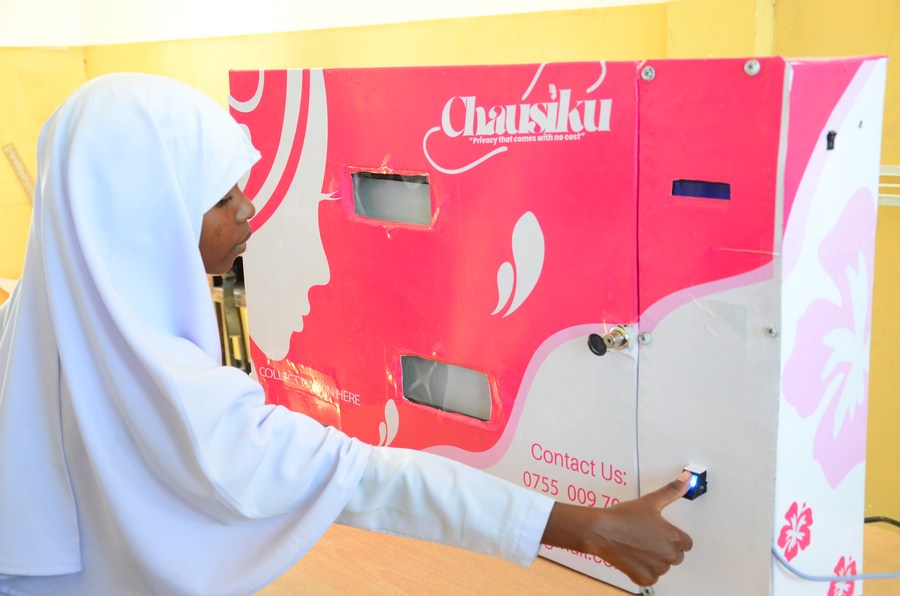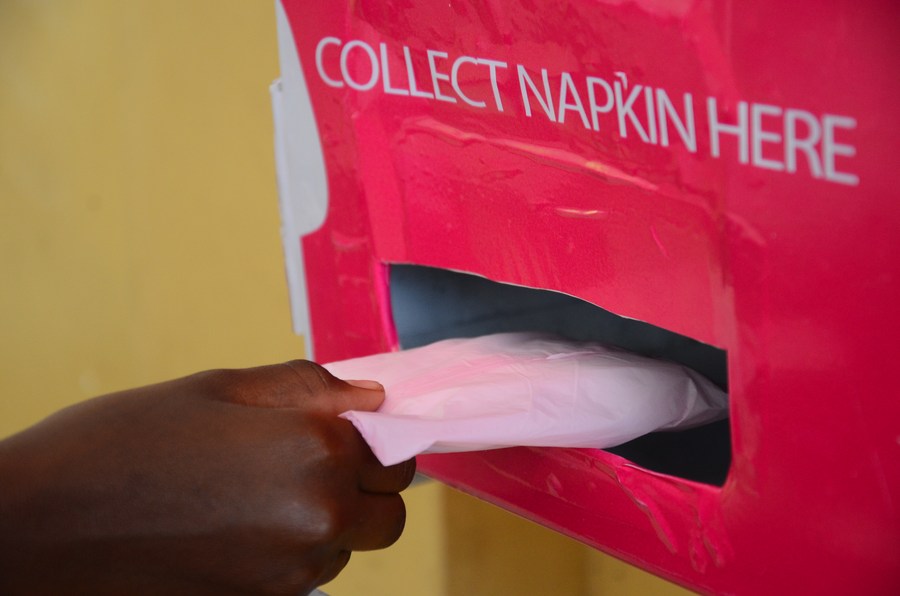
A schoolgirl of Salma Kikwete Secondary School in Tanzania's commercial capital Dar es Salaam collects free sanitary pads from a vending machine installed by non-profit organization Chausiku Foundation on Aug. 7, 2020. (Xinhua)
Sanitary pads vending machines provided by Chausiku Foundation are allowing more school girls to have uninterrupted education in Tanzania. The non-profit organization says the challenge now is shortage of funds that could be used to make more of such machines to help more girl students.
DAR ES SALAAM, Aug. 10 (Xinhua) -- Schoolgirls of Salma Kikwete Secondary School in Tanzania's commercial capital Dar es Salaam have found a sense of relief thanks to a sanitary pads vending machine that was installed recently at the school.
The locally made machine set up by Chausiku Foundation, a non-profit organization, provides the schoolgirls with sanitary pads for free, making them have no fear of going to school during their monthly cycle.
"We can now get the sanitary pads at the right time, in privacy and free of charge," said 17-year-old schoolgirl Irene Mathias, adding that before the installation of the vending machine she used to buy a pack of sanitary pads for about 3,000 shillings (about 1.3 U.S. dollars).
"When I do not have money to buy sanitary pads I use pieces of clothes which are very uncomfortable," she told Xinhua, adding that the vending machine will help girl students from poor families who cannot afford to buy sanitary pads from shops, pharmacies and supermarkets.
Dotto Rajab, a health teacher at the school, said menstruation and shortage of affordable sanitary pads are challenges that significantly hinder girl student's access to continued quality education.
"Girls who do not have access to sanitary pads miss three to four classes each month during their menstrual period," said Rajab with eight years of teaching experience.
"When a girl is in menstrual period she feels shy to report her situation in front of male teachers,"said the teacher, adding that the girls will now easily acquire the sanitary pads at the vending machine installed in a room where there is privacy.
Rajab said the school also provides sanitary pads but they are not enough for the 1,010 girls at the school."We only provide one piece of sanitary pad to a girl per day who reports to be in menstrual period. One pad is not enough but it helps before she goes home after school," she added.

A Schoolgirl of Salma Kikwete Secondary School in Tanzania's commercial capital Dar es Salaam collects free sanitary pads from a vending machine installed by a non-profit organization Chausiku Foundation on Aug. 7, 2020. (Xinhua)
In order to support girl students in the country, the Chausiku Foundation consisting of six young university graduates made their first vending machine for sanitary pads earlier this year. The machine has a fingerprint scanner to biometrically register the girl students and after registration each girl can get up to three pieces of sanitary pads per day during their periods.
"The idea behind the innovation of these vending machines for sanitary pads came after we had realized that most of the girls in schools were facing challenges in accessing pads," said David Msemwa, a member of the team.
"The main challenge that the foundation faces now is shortage of funds and we don't have enough money to make many machines, while we have a lot of schools in Tanzania," said Msemwa.
Edgar Kajuna, another member of the team, said Chausiku Foundation also provides education on menstrual health and menstrual hygiene management for the girls through seminars and social media platforms.
"We also have mobile applications that have things like Chausiku calendar where a girl can see and track her menstrual days and there's a platform where she can directly contact a medical doctor through WhatsApp in case of any medical problems," Kajuna added.
A recent survey shows that main consumers of disposable sanitary pads are urban-based women in the country, and only about two percent of school girls across Tanzania (mostly urban based) use the disposable pads.
Poor menstrual hygiene management can lead to poor performance and completion rates among girl students, and exposes them to health risks. ■



